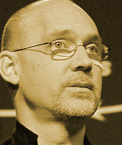- November/December Speaking Schedule
- Speaking in Moscow (Again)
- The Microsoft Private Cloud: A Technology Overview
- October Speaking Schedule
- Adopting a Common ALM Foundation: Why It Makes Sen...
- Cluster Computing Today: What's Changed and Why It...
- Video: Comparing Cloud Platforms
- Introducing Windows HPC Server
- Jazoon Keynote Slides
- Introducing OData
Opinari
# Thursday, December 22, 2011
A friend of mine is a therapist, with a graduate degree in counseling and years of experience. All of this helps her be good at what she does. The thing she's working with--the human brain--doesn't change, and so the older she gets, the more she knows about how her clients think and feel.
But suppose the people she worked with today were twice as smart in two years--their brains could process twice as much information in the same period of time--and their memories also became twice as good. Then suppose their intelligence and memory doubled again two years later, and then two years after that. Would her training and experience be as valuable? I don't think so. These quantitative changes lead to qualitative differences. The way she worked with her clients would need to change enormously over time, and she'd constantly be trying to adapt to the growth in their capacity.
This is exactly what happens in our world, of course. Things that were impossible--incredibly capable smart phones, say, or cheap cloud platforms--become possible, then common, then part of the foundation we rely on, all within a few years. And we're just getting started--there's still a long way to go. Mark Andreessen's essay on why software is eating the world paints part of this picture, and it's well worth reading.
For an even better discussion, read Race Against the Machine by Erik Brynjolfsson and Andrew McAfee. (It's a Kindle Single, so it's short and cheap.) One of their key points is the hard-to-comprehend power of exponential growth. Borrowing from Ray Kurzweil, the authors refer to the second half of the chessboard (read it to find out what they mean--it's worth it), their metaphor for the impact of continual doubling. The point is clear: We ain't seen nothing yet.
I wonder what my therapist friend's world would be like if her clients were software rather than people. How could she keep up with their endless evolution? Yet that's exactly the challenge all of us face in our careers. We're obligated to keep up with the relentless evolution of information technology--there's no alternative.
And there's only one way to do it. We have to change, and then change again, and then . . .
2 comments :: Post a Comment
Comments:
An evolving human brain is part of science fiction now, but nobody knows if, in the future, neuroscience will have this in conmon with software/hardware development.
Great post David. I was just watching a documentary on Ray Kurzweil the other day. I think eventually we will have some form of hardware installed in us to expand our brain power. Ways to increase its memory and computing power.
And yes technology seems to be evolving at such a rapid pace and its getting harder and harder to keep up with all the changes. Take in to account all the vast information bombarding us from all angles and its easy to see why the human brain is getting overwhelmed these days.
Post a Comment
And yes technology seems to be evolving at such a rapid pace and its getting harder and harder to keep up with all the changes. Take in to account all the vast information bombarding us from all angles and its easy to see why the human brain is getting overwhelmed these days.
<< Home



